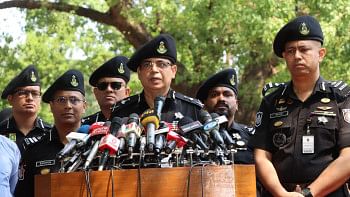America's role in Mujib murder
 Markin Dolile Mujib Hotyakando
Markin Dolile Mujib Hotyakando
Mizanur Rahman Khan
Prothoma Publishers
Mizanur Rahman Khan works hard to collect materials before writing . One of the good things about this book is that a good effort was made to present the contents, bibliography and index to readers. Perhaps in future an addition of chapter-wise notes would make the book an excellent read.
The writer has noticed a general lack of interest in knowing the details of this very important chapter of our history. Perhaps the way we are taught is partly responsible for that. Students are not encouraged to look critically at whatever they learn.
Americans were important players behind the 1975 coup in which Sheikh Mujibur Rahman was assassinated along with the members of his family. Soon after the coup a few important Indian newspapers reported that the Americans were the first ones who revealed the news of the coup in Dhaka. This is one of the reasons why American documents are important to know more about the coup and related happening.
While denying any American involvement behind the coup, Phillip Cherry, the CIA station chief at the American embassy in Dhaka, said that he knew that the Americans would be suspected. The question is why Americans are natural suspects. To know the answer to the question we have to remember the attitude of Dr. Kissinger toward the then East Pakistan, the role of the American government during our freedom fight and their activities after our independence. We have to remember the role of Pakistan during and after our independence movement. We have to remember the role of our pro-Pakistani right wing political force. To know all these the writer did not only look at the declassified American documents but also looked at other relevant documents from various sources. He has also quoted what important people wrote and said at that time or later. He has also interviewed various important people.
Kissinger was delighted to recognise the Mushtaq government. He took necessary preparations so that Mushtaq could escape if it was felt necessary. During 1971 struggle, Mushtaq was in touch with the American government in an attempt to form a confederation with Pakistan. Mushtaq was the head of the government that was formed after the assassination of Sheikh Mujibur Rahman. Christopher Hitchens writes in his book, The Trial of Henry Kissinger: "Kissinger was responsible for the killing of thousands of people, including Sheik Mujibur Rahman". According to Alexander Wall and others, Kissinger was responsible for the famine in Bangladesh in 1974. And Kissinger was, years later, awarded the Nobel Prize for Peace.
Faruq and Rashid visited the American embassy more than once and without appointment to discuss the purchase of weapons and to discuss toppling the government. The Americans saw Faruq and Rashid and discussed very serious matters. Was it not their duty to inform the Bangladesh government? They claimed that they had informed Mujib of a possible coup in 1975 but did not say who were behind it. They said that Mujib did not take it seriously. For this Kissinger called him the "the most stupid person in the world". Faruq , Rashid and their friends staged the coup and killed Mujib. Did they recruit Mushtaq or did Mushtaq recruit them? Boster commented about the Mushtaq government --- that the civil government had failed and that it was time for the army to take over. Zia seized power. Naturally it comes to our mind that all these groups of people were recruited by Kissinger's people. Pamela Gilbert has written that the CIA used reactionary Bengalis (against their own country).
On hearing the news of the assassination of Sheikh Mujibur Rahman, Moulana Moududi reacted by saying that it was "Allah's blessings" and a "victory of Islam". Kissinger said that he was delighted to recognise the Mushtaq regime. China recognised Bangladesh after the 1975 coup. Pakistan requested the Islamic countries to recognise Bangladesh. Except for one person, those who found places in Mushtaq's cabinet had also been members of Sheikh Mujib's cabinet.
The post-Mujib era was dominated by frequent attempted coups. Numerous army personnel were sentenced to death. At one trial, 237 were tried but 40 were hanged even before the trial was completed. Zia changed the constitution to welcome the Pakistani collaborators back into politics. Secular Bangladesh began its new journey --- backward.
Waheed Nabi is Fellow of the Royal College of Psychiatrists in Britain.

 For all latest news, follow The Daily Star's Google News channel.
For all latest news, follow The Daily Star's Google News channel. 



Comments